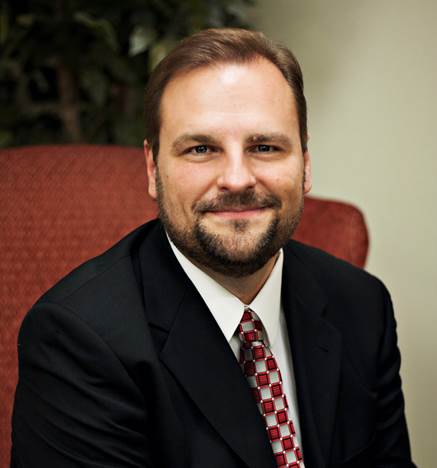 Chris Ritter is a General Conference delegate from the Illinois Great Rivers Conference of UMC where he leads a growing, multi-site congregation. He is the author of Seven Things John Wesley Expected Us to Do for Kids (May 2016, Abingdon Press). He and his wife, Becky, are the parents of four young adults. He holds an M.Div. from Candler School of Theology and a D.Min. from Perkins School of Theology. This post about Rule #44 originally appeared on his People Need Jesus blog.
Chris Ritter is a General Conference delegate from the Illinois Great Rivers Conference of UMC where he leads a growing, multi-site congregation. He is the author of Seven Things John Wesley Expected Us to Do for Kids (May 2016, Abingdon Press). He and his wife, Becky, are the parents of four young adults. He holds an M.Div. from Candler School of Theology and a D.Min. from Perkins School of Theology. This post about Rule #44 originally appeared on his People Need Jesus blog.
The Commission on the General Conference proposes an alternative to Roberts Rules of Order as a decision-making tool available to delegates at GC2016 next month in Portland. Called Rule #44, the new Group Discernment Process prescribes that delegates be divided up into groups of fifteen and have conversations monitored by representatives from COSROW, JustPeace, and GCRR about a defined group of petitions. A six-member Facilitation Team will take a written record of the conversations held in each group and craft legislative proposals that will come to the floor of General Conference for a vote. In order for Rule #44 to take effect, the Group Discernment Process will need to be adopted along with the other rules that will govern UM General Conference 2016.
I appreciate the commission working to develop a proposal to help us engage constructively on difficult issues. They were asked to do this by General Conference. These are good people that know and love the church. I wrote blogs here and here that attempted to support the proposal. That having been said, I can name forty-four reasons to seriously question Rule #44:
- This process is untested at General Conference.
- The “test-run” at the pre-conference briefing received very mixed reviews.
- It is complicated and complication breeds confusion.
- Complication often turns to chaos in the face of contention.
- Homosexuality, and issues of biblical authority that stand behind it, is our most contentious issue. All 100 petitions related to homosexuality have been selected by the Commission for the new Group Discernment Process.
- The Group Discernment Process is supposed to be designed for proposals that span multiple sections of the Discipline (ADCA, p. 45) but it is not proposed to be used for this purpose at GC2016.
- Handling our most toxic topic with an untested process is unfair to both the topic and the process.
- If anything substantive happens as a result of the process, the losing side will cry foul because it was accomplished by non-standard means.
- Small Group leaders will be trained to lead a discussion, but the full content of this training is not delineated. How discussions are framed can go a long way toward determining the outcome.
- There is no guarantee that the small groups will engage meaningfully with all the submitted petitions related to homosexuality. This means petitions funneled into the Group Discernment Process may not receive equal treatment to petitions handled by legislative committee.
- Non-elected monitors will yield power at General Conference based on the “Guidelines for Conversation” (p. 96-101) which are not submitted for approval or improvement by General Conference.
- The “Guidelines for Conversation”, while quoting a lot of Scripture, discount the possibility that there is an authoritative interpretation of any particular scripture. This tends to neutralize scripture being a tool in the Group Discernment Process at all.
- Approximately five dozen small groups will record multiple opinions on 100 petitions. This creates thousands of data points to be processed.
- A six-member facilitation team is charged with discerning the will(s) of General Conference by analyzing the flood of data in a process that remains undefined.
- Interpretation of mass amounts of data, without objective criteria, becomes highly subjective.
- There is no objective criteria for how the facilitation team is supposed to process the large amounts of data they will receive.
- The facilitation team is not required to justify their decisions or back them up with objective data.
- There is no process to question the judgments made by the facilitation team.
- There is no guarantee that the flood of raw data the Facilitation Team will be processing will be open for review.
- There is no guarantee the final six-member facilitation team will have the support of the majority at General Conference. The plurality election recommended in Rule #44 makes it very likely that the final six selected from a field of twenty-four would only receive supportive votes from a minority of GC delegates. With all the power vested in the facilitation team, it seems that these should be people trusted by a majority (or even a super-majority) of delegates.
- There is no guarantee that the Central Conferences will be represented on the final facilitation team.
- The facilitation team has the practical ability to kill all the petitions coming before General Conference related to homosexuality and replace them with their own.
- If the facilitation team finds consensus on human sexuality, it will automatically be suspect because there is obviously no consensus.
- If it does not find consensus it will have to craft competing legislation.
- The plan pretends that we can find and elect members of the facilitation team that are free from bias. None of us are.
- Humans tend to see what they want to see apart from objective measurements. Are we asking the facilitation team to do the equivalent of reading tea leaves?
- The facilitation team might draft a poisonously worded proposal representing one viewpoint and an elegantly worded proposal representing another.
- The facilitation team is given the power to craft new, unstudied legislation and bring it directly to the floor of General Conference for plenary vote. “You know all those petitions on human sexuality you have read and talked about for months? They are gone. Here are some new ones. Vote now.”
- We already know the will of many at General Conference through years of debate. What we don’t know is if or how we can accommodate these divergent opinions within the same denomination. The small group process is unlikely to yield this.
- The entire Group Discernment Process might be later struck down by Judicial Council.
- In Judicial Council Decision 876, the Council examined a Group Discernment Process not unlike the process outlined in proposed Rule 44 and held “[t]hat model,
from its distillation process, to its unique voting options process, neither allows full participation by delegates in all legislative decisions, nor does it permit final consideration and decisions to be made by the total conference membership. Therefore, this model cannot be upheld…” (Thanks to Keith Boyette’s position paper for pointing this out). - If the process is successfully challenged before Judicial Council, all legislation passed using the process will likely be null and void (as in Decision 876 above). Many General Conference delegates know the feeling of working hard on legislation only to have it immediately struck down by Judicial Council. It is not a good feeling.
- Delegates of similar opinion are not allowed to caucus together to develop a best version of their legislation.
- Those of minority opinions do not get the opportunity to craft minority reports (as in legislative committees). They have to relinquish the power to speak for themselves.
- Roberts Rules of Order, while sometimes rigid, are a time-honored and tested way to have fair and deliberate decision-making.
- Members of the legislative committees have already done the work to study the legislation on human sexuality that is coming before them in light of their knowledge of that section of the Discipline.
- Large-scale structural solutions are omitted from the legislation proposed to be handled by the process.
- There is already suspicion about the intent of the process, that someone trying to change the outcome by changing the process.
- The use of monitors, if heavy-handed, might run counter to the goal of genuine sharing of thoughts and feelings.
- The power to substitute one legislative item for another is sweeping power granted to a very few.
- The process of language translation will be difficult in the small groups and quality will surely vary based on the quality of the interpreters.
- The Group Discernment Process will be very time consuming.
- Each small group member is supposed to have the opportunity to review the data sheet from their group. Will these be translated into all the languages represented in the group? How long will that take and how will accuracy be assured?
- People and groups who took the time to submit legislation related to homosexuality did so assuming these would be handled in legislative committee and not by small groups.
I have tried to like Rule #44, but the more I think about it, the more disinclined I am to support it. I will be interested to hear the plenary discussion about Rule #44 next month in May.





Comment by MJ on April 12, 2016 at 11:30 am
A similar process was implemented at various Anglican gatherings under Abp. Rowan Williams. It was called the Indaba process. All it really accomplished was to dilute the strong voice of the Global South, and over-represent the views of the liberal West. They are still reeling from the distrust that was generated from this manipulative attempt to push forward a revisionist agenda.
Comment by Ella Pauline on April 13, 2016 at 4:59 pm
A view from the pew: Count me as one of the suspicious ones, given that only legislation dealing with sexuality is singled out for special handling. A while back, another delegate thought Rule 44 might be a good idea for the sexuality question because the regular process “was not working” for this particular topic. Truth is, the process is working just fine; it’s the people that aren’t willing to abide by the decision that are creating the problem.